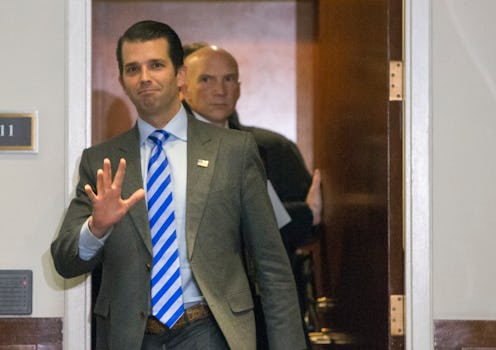News
Trump Jr. Can’t Spell Net Neutrality But Dares Repeal Critics To Explain What It Means

On Thursday, the Federal Communications Commission voted to strike down the Obama administration's net neutrality rules, a wildly unpopular decision that drew a lot of outcry. At least one adult first son didn't seem too upset about it, however, and he got a pretty good roasting in the process. Donald Trump Jr. didn't realize his dad's FCC chair was the one who pulled the trigger on net neutrality, for starters.
He also messed up the spelling of "neutrality," instead typing "neutality." The occasional typo is an unavoidable part of all of our online lives, in absolute fairness to the president's eldest son. However, it was paired with a far more obvious flub, making it even worse. Trump Jr. also called FCC chairman Ajit Pai "Obama's FCC chairman" ― Pai was in fact appointed by Don Jr.'s father back in January.
It's true that Pai was first brought into the FCC by former President Barack Obama back in 2012, reportedly on the advice of Senate Majority Leader Mitch McConnell, a Republican. He was never Obama's pick to lead the FCC, however, as that distinction went to Tom Wheeler, Mignon Clyburn, Julius Genachowski, and Michael J. Copps, the last of whom served five months in an acting capacity.
In other words, in addition to taking a random, needless shot at critics of a widely disliked policy change ― more than 80 percent of the American public supports net neutrality, according to a recent poll ― Trump Jr. flubbed the landing, and he got mocked for it on Twitter. A lot.
1. I'd Give Anything
2. Don Jr. Is Telling On Himself
3. Don Jr. Is Right
4. Don Jr. Trying To Understand
5. I'd Also Bet
6. I Seriously Wonder
7. You'd Be Wrong
8. I Would Pay Good Money
9. There's Zero Chance
10. Before You Embarrass Yourself
11. Seriously, Read The Thread
12. Arrogant Public Disdain
13. While Google Is Free
Trump Jr.'s tenuous grasp on the facts notwithstanding, it's undeniable that the telecom industry achieved a major victory on Thursday. Major internet providers have been striving for years to get the FCC to bring an end to net neutrality rules, which, among other things, will give them control and authority over which websites and services enjoy quicker connection speeds. In concert with the fact that cable internet providers enjoy widespread regional monopolies ― meaning the average consumer has little to no choice in who provides their connection ― Net Neutrality advocates view this as a dangerous and needless expansion of corporate control, and a blow against consumers and the public interest.
The net neutrality battle has been an on-again, off-again struggle between open internet advocates and telecom-backed interests for more than a decade, and with Republicans in control of all branches of government, it appears that the telecom side of that fight is ascendant, despite how overwhelmingly unpopular the change is.
Indeed, were this a policy matter that elected officials felt they'd pay a price for at the ballot box, the House and Senate might feel moved to act to counter the FCC's decision, seeing as even 75 percent of Republicans support net neutrality. In addition to the 89 percent of Democrats and 85 percent of independents who support it, those are the sorts of numbers you almost never see in today's hyper-polarized political climate.
And yet, the FCC was nonetheless willing to vote 3-2 to strip the rules, creating a new state of affairs in our digital lives. Of course, it's still possible that something or someone could intervene to prevent the change, as Congress could pass a law solidifying net neutrality, and a slew of lawsuits have already been filed by state attorneys general.